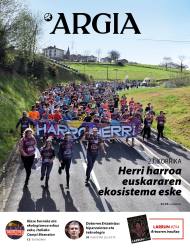‘La xarxa ultra’
Four months after my last collaboration with ARGIA, through this text I have taken up my opinion papers, but I will explain to you why I have left the pages of this endearing magazine this season.
The documentary La xarxa ultra (red Ultra), an audiovisual project for the Sense Ficció programme of TV3 (Catalan public television), was released on 20 February. We had the task of representing a phenomenon as worrisome as unknown to the majority of society: how the far-right is introduced into the lives of young people through social networks.
According to the macro-survey conducted by the Centre de Estudis de Opinó (CEO) of Catalonia, 9% of the young people of generation Z (approximately 15 to 25 years) are between 8-10 of the ideological scale, i.e. at the right end. The majority are men, and although the number seems anecdotal, the percentage is almost twice that of the previous generation.
This fact marks a new trend and indicates that a significant percentage of young people are for ultra-fast options. This trend has already influenced the politico-institutional framework of organizations in many parts of the world, and it seems that it has not reached its peak. Is it fashionable to have a facade? Why do some young people see the far-right as an anti-system?
The answers are multiple, but in the Spanish State the impulse and prestige that certain creative content and fake news platforms have had is highlighted. Moreover, all researches confirm that social networks are the most used information channels for new generations and not conventional media.
The so-called black facades feed on polemics emerging on portals such as the State of Alarm of Javier Negro to extend hate speeches with total impunity
The so-called facades, such as Infovlogger or Libertad and what Surja, feed on the controversies that arise on portals such as the State of Alarm of Javier Negre, to intoxicate the political debate and spread hate speeches with impunity. Platforms play a very important role, as instead of punishing misogynist, homophobic or racist opinions, algorithms promote conflicting content and, therefore, manage to keep users on the web and monetize publications.
At the top of this complex network we find aspects such as the Vox and PP. By hiring institutional advertising and endowing them with their own budget lines, they finance these new Internet celebrities to divert attention and move the media agenda in their favour.
There was a condition for making the documentary: for the protagonists to speak. So we interviewed many far-right teenagers and the three founders mentioned above. Was it a great challenge, how to give voice without promoting or justifying their speeches? I'm not going to spoiler you, but so far the audience and criticism have praised the effort.
Our main conclusion is that, given that you have had many spectators, we have managed to highlight one of the strategies that you are using to win the game. It was no longer feasible to ignore the phenomenon in order to prevent its growth. I invite you to see the documentary, to draw your own conclusions and to act accordingly, so that the seed of hatred does not flourish among our young people. We are still on time.
Bidali zure iritzi artikuluak iritzia@argia.eus helbide elektronikora
ARGIAk ez du zertan bat etorri artikuluen edukiarekin. Idatzien gehienezko luzera 4.500 karakterekoa da (espazioak barne). Idazkera aldetik gutxieneko zuzentasun bat beharrezkoa da: batetik, ARGIAk ezin du hartu zuzenketa sakona egiteko lanik; bestetik, egitekotan edukia nahi gabe aldatzeko arriskua dago. ARGIAk azaleko zuzenketak edo moldaketak egingo dizkie artikuluei, behar izanez gero.
When you work with older people or people with physical and neural diversity, you realize that the idea of competition in our society limits us a lot as a species. That is, our system puts you in value by doing things specifically, and what it doesn't do is incapable of the... [+]
I wanted to write for the Christmas lights and claim to become an annual tradition in this time of street lighting, a welcoming, joyful and joyful public space from the point of view of the class. But, of course, also warm public spaces where some young people can be warming up... [+]
He forgives the oak trees, oak trees, oaks, herons, strawberries, dressings, chestnuts, birch, gorostidias, chamomiles, pine trees and all the societies of the trees, but today the hayedo has a date on the occasion of the celebrations of the winter border.
It is easier for me... [+]
Euskaraldia comes back. Apparently, it will be in the spring of next year. They have already presented it and the truth is that it has surprised me; not Euskaraldia himself, but his motto: We'll do it by moving around.
The first time I have read or heard it, the title of the... [+]
When the heteropatriarchal capitalist colonial system is questioned and fought, it attacks mercilessly. Using all the tools at your disposal to strengthen, strengthen and consolidate institutional power, media, justice, language, culture, violence...
In Switzerland, where every... [+]
I do not know if you also have the same perception – I recognise this: here I have started to write in a scientific way. I am referring to the natural extension of the word laziness. I hear more and more in the corners of Hego Euskal Herria: Basque, Spanish and, of course,... [+]
Many at Christmas feel more lazy than illusion when we think about meals and family gatherings. But we anticipate that it is not food that makes us feel collectively uncomfortable, but the normativity that defines the traditional family. Moreover, we would dare to say that the... [+]
I have always found the way in Spanish to the carriages that can be found here and there: humiliating. Isn't it a pretty light, white name or doesn't it have any connotation? After all, everything that was going on there had to be humiliated. It is known that for the god of... [+]
The end of the Syrian Arab Republic has caused great surprise at the way in which it has taken place: fast and almost without resistance. However, it is not so strange when we consider that the country was destroyed, impoverished and trodden. Most Syrians have long been... [+]
Novelty is usually one of the most heard words associated with the Durango Fair. The novelty is there, and here's the novelty. However, in some cases it is sufficient to give a different aspect to the previous one to paste that label. The CDs and remastered reeditions with... [+]
The Basque country has a very large water flow in the shortage. Every local drop curls and revives our culture. Offer a sea of water to that thirst. Although the Basque Country has come from a deep and dark well, we have all drawn our sample of salt water and turned it into a... [+]
Young people start consuming pornography before, as porn is their only sex education. How on earth have we come here?
Today, it has to be acknowledged that thanks to the Internet it is much easier to see pornography. Unfortunately, through a click, the 7-9 year-old boy comes to... [+]


















